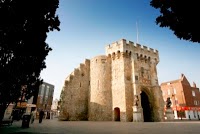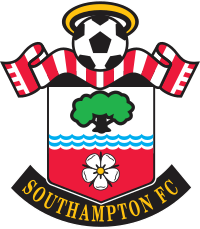- watch a short video about the city of Southampton and do a comprehension exercise
- read about the city of Southampton on a Tourist Guide page and do a comprehension exercise
- practise superlatives
- practise language for describing a city
- describe a city / town
1) Discuss
- Where are you from?
- Where do you live?
- Do you like your town?
- What can people do there?
- What are the best things about living there?
- Does anyone famous come from there?
- Did any famous historical events happen there?
So let's have at look at Southampton.
 2) Watch
2) Watch Watch the video
1) Find out
- What can you do in Southampton?
- Would you like to live / study / work there?
2) Watch again and do this quiz
3) Read
Quickly read the "Superlative Southampton" guide below
1) Find the answers to these questions.
- Where is Southampton?
- What kind of city is it?
- Have any famous people come from Southampton?
- Why is it "superlative"? How many examples of superlatives can you find?
Superlative Southampton - A City Guide
Location
Southampton is the largest city on the south coast of England. It is a major port and the closest city to the New Forest National Park. The city lies roughly in the centre of the south coast of England approximately halfway between the towns of Bournemouth and Portsmouth.
The Port
 Southampton is the biggest commercial and container port on the south coast of England. It has also been home to many ocean ”liners” and passenger ships. It presently has three large cruise ship terminals, with another one in the offing.
Southampton is the biggest commercial and container port on the south coast of England. It has also been home to many ocean ”liners” and passenger ships. It presently has three large cruise ship terminals, with another one in the offing.
Southampton is a vibrant, modern city and has one of the most modern shopping centres in the south of England.The mix of high street stores and traditional shops and boutiques has made the city one the UK's most popular retail destinations. It also has wealth of sporting, leisure, entertainment and cultural opportunities. The city centre has an unusual number of large parks. It is one of the greenest city centres in the UK.
Southampton has a variety of entertainment choices from the ice rink and paintballing to the Ocean Village Cinema and Megabowl. Southampton has an exciting nightlife which includes many restaurants and bars. Historic Oxford Street is home to Southampton's finest restaurants.
As well as numerous indoor sports, keep fit and swimming facilities Southampton Sports Centre is one of the largest open air sports and athletic arenas in the south of England. In contrast to the ‘out of town’ location of the Sports Centre, Championship League Southampton Football Club has its state-of-the-art football stadium set down firmly in the heart of city’s waterside population, on the banks of the River Itchen, very near to the original Saxon settlement of Hamwic.
Southampton's elegant City Art Gallery contains 3,500 works of art from six centuries. The work of up and coming artists and designers can be found in the nearby Millais Gallery. The Mayflower, the largest theatre in southern England, puts on musicals as well as ballet and operas. The Nuffield Theatre, at Southampton University, stages performances from Shakespeare to contemporary drama. The city is also home to some of the region's best concert halls and two large multi-purpose venues staging major rock, contemporary and classical music events.
“Sotonians”
The city represents the core of the Greater Southampton region, with a population of 228,600. The city's name is sometimes abbreviated in writing to "So'ton" or "Soton", and a resident of Southampton is called a “Sotonian”.
Southampton is noted for being the home of the RMS Titanic. The newest museum (opened in 2012) in the city is the SeaCity Museum which tells the story of the people of the city, their lives and historic connections with Titanic and the sea. Southampton was also where the Spitfire, the famous World War II aircraft, was designed and built. It has been home to many of the largest and most famous cruise liners in the world for over a century and was once known as the "Gateway to the world".
 |
| Benny Hill |
Adapted from http://en.wikipedia.org/wiki/Southampton and http://www.stga.org.uk/southampton-in-brief.html
2) Look at the text again.
Some of the words are in bold. Can you match the words in bold with the definitions below?
If you are not sure try and guess from the context and choose the answer that fits best.
3) How much can you remember? Do the quiz.
4) Practise superlatives
Fill in the gaps with a superlative. If you are not sure how to make superlatives look here http://efllecturer.blogspot.co.uk/2011/04/comparatives-and-superlatives.html
If you can't remember the answers look at the reading text again.
Printable worksheets here
5) Write
Write a guide for your town
- Use the headings in the Southampton guide to help you (Location, Leisure, Sport, Arts, History, Famous Residents etc)
- Use some of the language in the text for describing places (situated, vibrant, facilities etc).
- Use some superlatives (the best, the largest, the most famous etc)
8) More on Southampton
Solent University guide to Southampton
http://portal.solent.ac.uk/hellouni/southampton/southampton.aspx
Wikitravel http://wikitravel.org/en/Southampton
Visit Southampton http://www.visit-southampton.co.uk/
SeaCity Museum http://www.seacitymuseum.co.uk/
The Port of Southampton http://www.plimsoll.org/
Southampton Football Club http://www.bbc.co.uk/sport/football/teams/southampton
More practice
Speaking Presentation - "Your City" http://efllecturer.blogspot.co.uk/2011/07/your-city-past-and-present-powerpoint.html
The Changing UK - Southampton
Comparative and Superlative quiz http://anthonyhalderman.com/english/compsup.htm








